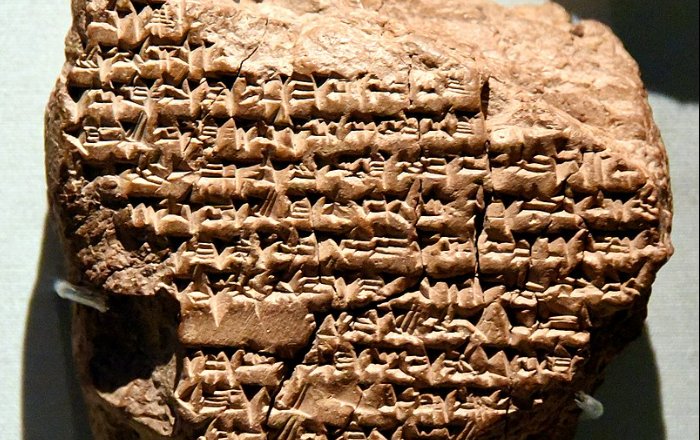AncientPages.com - On October 1, 331 BC, the Battle of Gaugamela was fought between Alexander the Great of Macedon and King Darius III of Persia. It was the final and successful military encounter. Alexander became the King of all Asia after this victory.
Gaugamela (which means "The Camel's House") was a village on the banks of the river Bumodus. The battle site is considered to be Tel Gomel, located in northern Iraq.
Account of Alexander's victory over the last Achaemenid king Darius III at the battle of Gaugamela on 1 October 331 BCE and his triumphant entry into Babylon, in cuneiform. Babylon, Iraq. British Museum
Darius prepared a battlefield to stop Alexander's incursion into the Persian Empire and posted his troops to await Alexander's advance. Darius had the future battlefield's terrain smoothed so that his many chariots could operate effectively against the Macedonians.
His total forces greatly outnumbered Alexander, whose forces amounted to about 40,000 infantry and 7,000 cavalry.
Alexander's well-trained army faced Darius' massive battle line and organized for an attack, charging the left of the Persians' line with archers, javelin throwers, and cavalry while defending against Darius' outflanking cavalry with reserve flank guards.
A charge by Persian scythed chariots aimed at the center of Alexander's forces was defeated by Macedonian lightly armed soldiers. During the combat, Darius' cavalry on his left flank was drawn into the battle, leaving the Persian infantry in the center of the battle line exposed.
Alexander and his cavalry immediately wheeled half left, penetrated this gap, and then wheeled again to attack the Persians' flank and rear.
This maneuver caused Darius to take flight, and panic spread through his entire army, which began a headlong retreat while being cut down by the pursuing Greeks. The Macedonian victory ended the Persian Empire founded by Cyrus II the Great, and left Alexander, the master of southwest Asia.
"The ensuing Battle of Gaugamela would prove to be one of the most important conflicts in ancient history, not just because of its sheer scale (in total, there might have been as many as 200,000 troops involved), but because of its consequences and reverberations in the decades to come.
It would signal the end of an ancient empire and the forging of a new one, but more importantly, it would establish Hellenistic culture as the dominant force in the region for centuries. Furthermore, it would confirm, without a shadow of a doubt, that Alexander was the undisputed power in the region and that Macedon was a force to be reckoned with..." 1
AncientPages.com
Expand for referencesReferences:
History, Captivating. The Hellenistic World
Freeman, Henry. Alexander The Great
